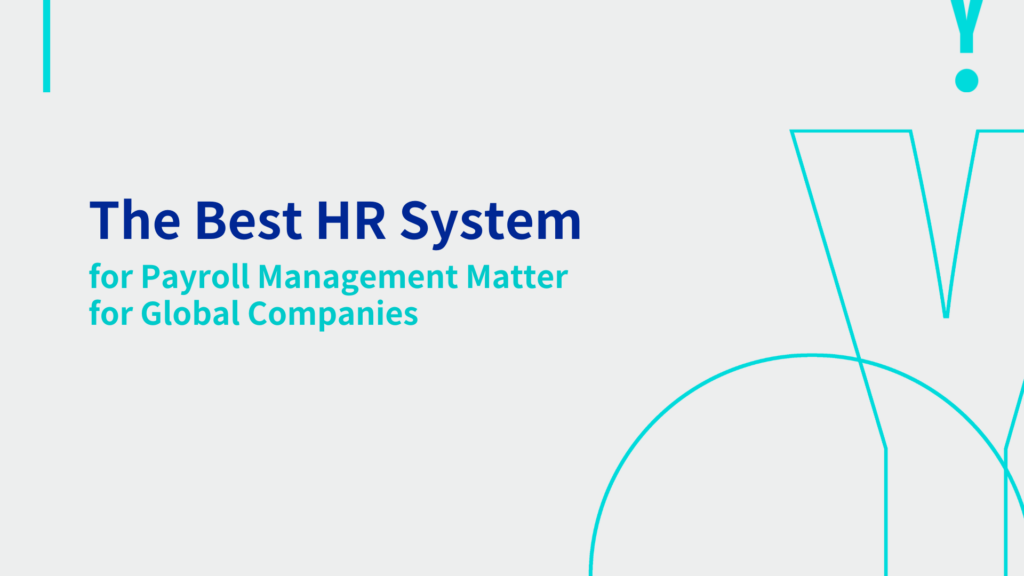
Global companies often face the monumental challenge of managing payroll across multiple regions with distinct regulations. Traditional systems often fail to meet these demands, leading to inefficiencies, compliance risks, and employee dissatisfaction. As businesses expand internationally, integrating a robust HR payroll system becomes more than just a necessity—it’s a strategic advantage.
Imagine seamlessly handling multi-currency transactions, complying with diverse labor laws, and ensuring timely payouts. That’s what a modern HR system for payroll management promises to deliver. Moreover, with the workforce becoming increasingly globalized, offering localized payroll solutions builds trust and improves employee engagement.
So, how do these systems tackle these complicated challenges? And more importantly, why should your global business make this investment?
Let’s dive deeper and find out.
The Complexities of Managing Global Payroll with An HR System
Compliance Challenges across Borders
Compliance is the backbone of payroll management. Each country enforces unique tax laws, labor standards, and reporting requirements. For global companies, manually managing these variations often results in costly errors and penalties. Does this sound familiar?
This is where modern HR payroll systems shine. By automating tax calculations and generating accurate reports tailored to local regulations, they save companies significant time as well as resources.
For instance, consider a multinational company operating in 10 countries.
Without automation, tracking changes in tax laws alone becomes an overwhelming task. Hence, a modern HR payroll system ensures businesses stay compliant effortlessly while reducing risks associated with audits.
Multi-Currency Transactions & Exchange Rate Fluctuations
Paying employees in different countries requires handling multi-currency transactions seamlessly. Exchange rate fluctuations can further complicate the process, thus, leaving room for errors and inconsistencies. You might be facing such issues.
Advanced human resource management systems and payroll systems solve this by enabling real-time currency conversion. They also ensure accurate salary distribution.
Imagine not having to worry about whether your employees are receiving the correct amount due to exchange rates. Doesn’t that sound like a relief?
These systems are designed to handle these complexities efficiently, thus, reducing financial discrepancies and building employee trust.
Diverse Time Zones And Payroll Schedules
Managing payroll across time zones demands precise scheduling and synchronization. Without proper systems, delays are inevitable. HR payroll platforms, however, offer automated scheduling tools, ensuring employees receive timely payments, regardless of their location.
Have you ever encountered delayed payments because of timezone confusion?
Employees in one region shouldn’t have to wait because of operational hours in another. Therefore, by adopting an efficient HR management system, you can eliminate such frustrations and foster a sense of reliability within your team.
The Strategic Advantages of A Unified Payroll System
Boosting Operational Efficiency
An integrated payroll system eliminates redundant tasks and also reduces human intervention. Automated workflows save time, allowing HR teams to focus on strategic initiatives. Additionally, by centralizing payroll operations, companies can reduce administrative overhead and enhance productivity.
Think about this: What could your HR department achieve if they weren’t bogged down by manual processes?
A robust HR system frees up time and resources, enabling your team to contribute more meaningfully to your company’s growth.
Enhancing Employee Experience
Employees value timely payments and transparency in payroll processing. A reliable HR payroll system ensures accurate salary calculations, reducing disputes as well as fostering trust. Many platforms also provide self-service portals, empowering employees to access payslips, tax forms, and leave balances conveniently.
Let’s consider the employee perspective for a moment. Wouldn’t you appreciate having control and visibility over your payroll information?
Consequently, this empowerment leads to higher employee satisfaction and retention. Thus, it makes payroll systems an investment in your team’s happiness.
Ensuring Data Security & Confidentiality
Payroll data contains sensitive information about employees and the company.
In general, modern systems incorporate advanced encryption and access control features. These measures protect data from unauthorized access, thus, ensuring compliance with global data protection standards like GDPR.
If your company has been concerned about data breaches, transitioning to a modern HR payroll system could be the solution you’re looking for. These platforms prioritize security, giving you peace of mind.
In this regard, visit YOOV for the best payroll system for all of your employees spreading across multiple countries.
Key Features to Look for in An HR Payroll System
- Scalability for Growing Businesses
Global companies often experience rapid expansion. Hence, choosing a scalable payroll system ensures the platform grows alongside the business. This avoids the hassle of migrating data and processes to a new system later.
Imagine onboarding a large number of employees without breaking your system. So, doesn’t scalability sound essential for sustained growth?
- Multi-Language Support for Global Teams
A global workforce necessitates a system that supports multiple languages. Multi-language interfaces enhance usability and ensure all employees feel included.
Think about it: An employee in Malaysia should find their payroll system as intuitive as one in Germany. Language inclusivity fosters inclusivity across borders. Hence, search for the most efficient HR system for your business offices.
- Customizable Workflows
Every business has unique payroll needs. A customizable system allows organizations to configure workflows according to their specific requirements. Ultimately, this flexibility ensures a perfect fit for diverse operational models.
Would you rather adapt your business processes to fit a system, or have a system adapt to your needs?
Probably, the choice is clear.
- Real-Time Reporting & Analytics
Payroll systems with robust reporting tools offer actionable insights. From identifying cost-saving opportunities to monitoring compliance, analytics empower HR teams to make informed decisions.
Imagine having instant access to metrics that reveal inefficiencies in your payroll processes. Doesn’t that sound like a game-changer?
Overcoming Resistance to System Implementation
Addressing Common Concerns
Employees and management often resist adopting new systems. Concerns range from cost implications to learning curves. However, educating stakeholders on the long-term benefits of automation can ease the transition.
Have you faced pushback from your team when introducing new tools?
A clear presentation of the system’s value can make a world of difference.
Training And Support for Seamless Adoption
Investing in user training ensures smooth implementation. Moreover, vendors providing 24/7 support play a crucial role in addressing any technical challenges. A well-supported human resource management system fosters confidence among users. Training as well as support bridge the gap.
Trends Shaping The Future of HR Payroll Systems
- AI & Machine Learning Integration
AI-powered systems predict payroll anomalies, detect fraud, and optimize tax strategies. Machine learning continually improves system performance and accuracy. These technologies revolutionize payroll management for global companies.
Imagine an AI tool catching payroll errors before they affect employees. That’s the future of payroll management.
- Cloud-Based Solutions
Cloud-based payroll platforms offer accessibility and scalability. These systems ensure data synchronization across regions while reducing infrastructure costs. Cloud technology enables real-time updates and better disaster recovery mechanisms.
- Focus on Employee-Centric Features
Future payroll systems emphasize employee experience, offering features like mobile access, instant payment options, and personalized dashboards. These tools cater to the evolving needs of a global workforce.
Don’t you think offering employees such convenience would give your company a competitive edge? These features are becoming standard expectations.
End Note
Managing payroll for a global workforce is a challenging yet rewarding endeavor. The right HR management system for payroll addresses compliance complexities enhances efficiency, and improves employee satisfaction.
Hence, investing in a modern, scalable, and secure payroll platform is no longer optional for global companies—it’s a strategic imperative. Therefore, by embracing technology and adapting to evolving trends, businesses can turn payroll management into a competitive advantage.
Are you ready to transform your global payroll operations with the best HR system?
The time to act is now.
Connect with YOOV

Tel:+852 2988 8883
WhatsApp:Click Here
Email:cs@yoov.com
Website:https://www.yoov.com/